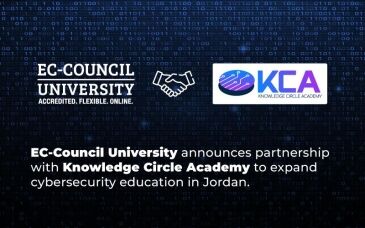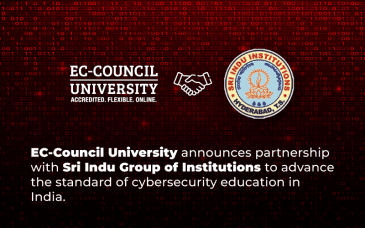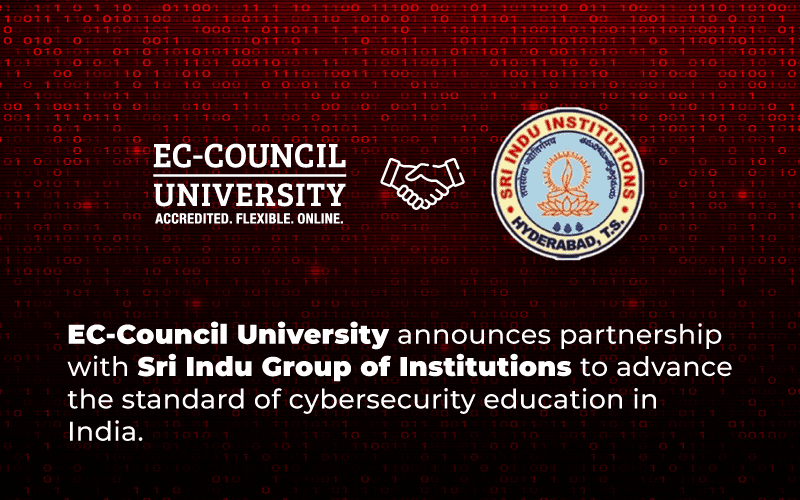Understanding the Five Master’s Degree Specializations at EC-Council University
Medicine and engineering are no longer the only go-to options for students seeking lucrative careers. If you’re interested in a career in a fast-growing, challenging, and rewarding field, cybersecurity may be the perfect fit for you.
The digital era presents endless opportunities for cybercriminals to exploit individuals and organizations—research indicates that a hacking attempt occurs every 39 seconds (“Hackers attack,” 2017). Because demand for cybersecurity professionals is high and supply is limited, companies are willing to pay top dollar for personnel who can protect their systems and data, with salaries for U.S. cybersecurity jobs averaging over $112,000 per year (ZipRecruiter, 2022).
In a cybersecurity master’s program, you’ll learn the skills and knowledge you need for a wide range of jobs in this rapidly developing sector. In this article, we’ll cover how the five specializations offered in the Master of Science in Cybersecurity (MSCS) program at EC-Council University (ECCU) prepare students to work in a variety of cybersecurity domains.
EC-Council University’s Master of Science in Cybersecurity
Various universities throughout the world offer master’s degrees in cybersecurity. These programs equip graduates to work in the cybersecurity industry by educating them in areas like security threat assessment, computer security management, and incident response, among many others.
At ECCU, our fully online cybersecurity master’s program prepares students for roles in cybersecurity, IT, and information assurance at top corporations, government agencies, and other organizations. Candidates in the MSCS program at ECCU can choose from five specializations: Security Analyst, Cloud Security Architect, Digital Forensics, Incident Management and Business Continuity, and Executive Leadership in Information Assurance. All ECCU master’s degree tracks are designed to be completed in 2 years.
The coursework in MSCS curricula also parallels the knowledge requirements for several leading certifications from EC-Council, meaning that students have the opportunity to graduate with not just an accredited master’s degree but also valuable industry credentials. After completing the MSCS program, graduates will be able to test for as many as four industry-recognized EC-Council certifications, depending on their chosen specialization.
1. Security Analyst Specialization
The Security Analyst MSCS specialization focuses on the methodologies and techniques used in vulnerability assessments to detect and decrease the risk posed to the security of a company’s infrastructure. Candidates who choose this specialization will take classes in network security, ethical hacking, vulnerability analysis, and penetration testing, among other topics.
Security Analyst graduates will be prepared for a wide range of job roles, including information security analyst, security architect, system administrator, and cyber defense analyst. The coursework in the Security Analyst track is also mapped to the following EC-Council certifications:
- Certified Cloud Security Engineer (C|CSE)
- Licensed Penetration Tester (L|PT)
- Certified Network Defender (C|ND)
- Certified Ethical Hacker (C|EH)
2. Cloud Security Architect Specialization
Students in the Cloud Security Architect MSCS specialization learn how to plan, implement, analyze, design, test, and support an organization’s on-premises and cloud security infrastructure. Candidates are trained to defend enterprise architectures against the most advanced cyberattacks through coursework in risk management for cloud platforms, business aspects of cloud security, and more.
While Cloud Security Architect graduates will be well equipped for positions like cloud security architect, cloud security engineer, and cloud support consultant, they’ll also be prepared to take on broader-scope cybersecurity roles, like enterprise architect and systems developer. This MSCS track also covers the knowledge requirements of the following EC-Council certifications:
- Certified Application Security Engineer (C|ASE)
- Certified Network Defender (C|ND)
- Certified Ethical Hacker (C|EH)
3. Digital Forensics Specialization
The Digital Forensics MSCS specialization teaches students the skills required for a career in computer forensics, the branch of forensics dedicated to recovering and analyzing data from digital devices. In addition to learning universally applicable cybersecurity concepts like ethical hacking and network defense, digital forensics students take specialized classes on topics like cybersecurity law, mobile forensics, and criminal psychology.
Candidates who complete the program can apply for jobs like cybercrime investigator, forensic analyst, and incident responder, among many others. The Digital Forensics concentration prepares candidates for the following EC-Council certifications:
- Computer Hacking Forensics Investigator (C|HFI)
- Certified Network Defender (C|ND)
- Certified Ethical Hacker (C|EH)
4. Incident Management and Business Continuity Specialization
The Incident Management and Business Continuity MSCS specialization is designed to teach students how to handle and respond to security incidents by identifying vulnerabilities and implementing effective countermeasures to reduce risk. To equip them for these responsibilities, candidates study topics including disaster recovery, incident handling, and organizational change management.
In addition to being prepared for careers as disaster recovery analysts, incident handlers and responders, and business continuity managers, graduates from this MSCS concentration will be ready to take on the following EC-Council certification exams:
- EC-Council Disaster Recovery Professional (E|DRP)
- EC-Council Certified Incident Handler (E|CIH)
- Certified Network Defender (C|ND)
- Certified Ethical Hacker (C|EH)
5. Executive Leadership in Information Assurance Specialization
The Executive Leadership in Information Assurance MSCS specialization provides candidates with the leadership and technical skills they need to succeed in executive-level information security positions and effectively manage IT security projects. Students in this concentration take a curriculum that encompasses both business and cybersecurity, including coursework in organizational behavior, project management in the IT context, and cross-cultural leadership.
This MSCS specialization gives candidates the requisite background for a variety of leadership roles in cybersecurity, including chief information security officer, chief security officer, and IT project manager. Graduates are also eligible to test for the following EC-Council certifications:
- Certified Chief Information Security Officer (C|CISO)
- Certified Network Defender (C|ND)
- Certified Ethical Hacker (C|EH)
Ready to Take the Next Step?
Visit the ECCU website to learn more about our programs, get started with the admissions process, and explore the five MSCS specializations in greater depth. Now is the perfect time to advance your career in cybersecurity—contact us today!
Found this article interesting? Follow EC-Council University on Facebook, Twitter, Instagram and LinkedIn to read more exclusive content.
References
Hackers attack every 39 seconds. (2017, February 10). Security Magazine.
https://www.securitymagazine.com/articles/87787-hackers-attack-every-39-seconds
ZipRecruiter. (2022). Cyber security salary. Retrieved February 28, 2022, from
https://www.ziprecruiter.com/Salaries/Cyber-Security-Salary-in-United-States












